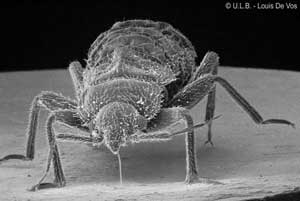|
 Bed
bugs, for years linked to unsanitary households, poverty
and the darker side of Dickens, are making a comeback. Bed
bugs, for years linked to unsanitary households, poverty
and the darker side of Dickens, are making a comeback.
Infestations of the
bugs, which feast on human blood and leave itchy weals
on the skin, had been virtually eliminated in prosperous
countries but have had a resurgence in the last seven
years.
In America, wealthy
householders have been horrified to discover that the
cause of their bites, often on the arms and shoulders,
had been bed bugs. Australia has also reported a recent
"dramatic" increase.
Experts are unable to
explain why the human bed bug, Cimex lectularius, has
returned, but speculate that it may have become
resistant to pesticides. Another theory is that
pesticides used on other household pests, such as ants
or cockroaches, are now species specific and are missing
the bed bugs, allowing them to breed and multiply.
Clive Bose, a pest
management specialist, told the Institute of Biology's
journal, Biologist, yesterday: "Data from some sources
indicate that since the mid-1990s the numbers of
reported infestations have almost doubled annually,
although numbers are nowhere near pre-war levels."
The 5mm bugs are reddish
brown and fast runners. They also have a flat shape
which means they can hide in narrow cracks in furniture
and the seams of bed clothes.
Starving them of blood
does not help since the adults can live for about a year
without nourishment. The adult female lays two or three
eggs a day which she attaches to rough surfaces and
which hatch in about 10 days. They do not normally live
on humans.
Mr Bose said some
experts thought that the increase in long-haul travel
might explain the increase but he believes this is
unlikely as the recent infestations have not been of the
tropical bed-bug, Cimex hemipterus, as might have been
expected.
An alternative theory
was that the bugs were becoming resistant to pesticides,
he said. A study in East Africa had shown a link between
increased use of pesticide-treated mosquito nets and
increased resistance in bed bugs.
The pesticide involved,
pyrethroid, was widely used in bed-bug sprays in
developed countries, he said.
|